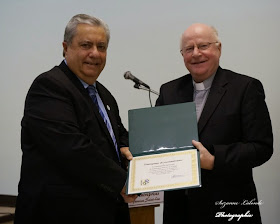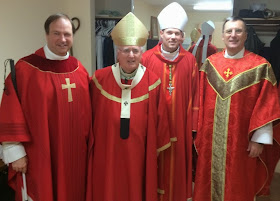La fête de saint Luc,
évangéliste – le 18 octobre 2014
Le 175e
anniversaire de la paroisse Saint-Luc, Curran, ON
Saint Luc,
évangéliste : un témoin de la Joie de l’Évangile…
[Textes : Isaïe 52,
7-10; Psaume 144(145); 2 Timothée 4, 9-17; Luc 10, 1-9]
Les
anniversaires sont des moments importants dans la vie des paroisses, comme ils
en sont dans la vie des individus, des familles, des peuples.
Ils
permettent de regarder le passé et de l’apprécier à sa juste valeur. Ils
invitent à considérer le présent en discernant ce qu’il recèle de beau et de
bon. Ils impliquent aussi un regard vers l’avenir. Les anniversaires existent
pour stimuler le goût de vivre, d’aller de l’avant.
Au
cœur des anniversaires des paroisses, il y a toujours une messe, une eucharistie. Le mot eucharistie
signifie action de grâce. L’eucharistie que nous célébrons a donc pour but de rendre grâce
pour l’histoire de votre paroisse. Pour toute l’histoire : celle d’hier,
celle d’aujourd’hui et même celle de demain qui est à construire.
« Le
règne de Dieu est tout proche de vous. » Ces paroles de Jésus dans
l’évangile d’aujourd’hui expriment notre reconnaissance pour tout ce que nous
ont légué les fondateurs et tous ceux et celles qui ont poursuivi le travail
durant toutes les années.
Il en
faut de la générosité et du dévouement, il en faut du travail accompli dans
l’ombre et le plus souvent bénévolement,
pour garder une paroisse vivante et rayonnante.
Merci, à tous les ouvriers d’autrefois et ceux d’aujourd’hui. Grâce à
eux, grâce à vous, l’Évangile a été annoncé et il l’est encore. Les sacrements
ont été célébrés et ils le sont encore. La pratique de la vie chrétienne a été stimulée et elle l’est encore.
Il
s’en passe des choses pendant cent soixante-quinze ans.
Il
s’en est passé des choses dans l’Église
et dans la société.
Les
deux ont beaucoup changé. Le passé des paroisses n’est jamais parfait. Leur
présent non plus. Quant à leur avenir, nous ne savons pas ce qu’il sera. Mais
nous rendons grâce pour tout, parce que tout repose entre les mains de Dieu
parce que Dieu accompagne la marche des paroisses vers leur avenir comme il a
autrefois accompagné la marche de son peuple vers la terre promise.
Frères et sœurs, dans sa bonté, le Seigneur vous a donné saint Luc comme
patron. Permettez-moi de rappeler, en ce jour de sa fête, l’œuvre immense de celui
qui est depuis 175 ans votre protecteur et modèle…
En
plus de son évangile, Luc est l’auteur du livre
des Actes des Apôtres, livre qu’on
appelle parfois Les Actes du Saint
Esprit. La somme de ses écrits constitue environ quarante pour cent du
Nouveau Testament.
Tout
un exploit !
L’évangile
de Luc est unique à plusieurs égards. Il touche des thèmes et met en lumière
des épisodes de la vie de Jésus que l’on ne retrouve pas dans les autres
évangiles.
Cet
évangéliste dont les écrits nous font voir la grandeur de la compassion et de la
miséricorde de Dieu, nous présente le grand plan de Dieu à travers celui qu’il
a envoyé rétablir les valeurs et l’espoir chez les humains, son Fils Jésus.
Dans
ses écrits, Luc souligne l’importance de
la prière et de la foi, de l’action de l’Esprit Saint dans la vie de Jésus et
de ses disciples. Il nous montre Jésus en prière lors des moments forts de sa
vie.
Luc
nous dit qu’il ne peut y avoir de véritable conversion sans un changement dans
notre comportement. Luc nous rappelle que Dieu a un amour préférentiel pour les
pauvres, pour les affligés, pour les exclus, pour ceux et celles qui sont
fragiles, malades, ou découragés; c’est d’abord pour eux que Dieu a envoyé son
Fils sauver le monde. Luc nous parle aussi de la présence et de l’importante
contribution des femmes parmi les disciples de Jésus.
Plus
que tout autre évangéliste, Luc affirme le caractère universel du ministère de
Jésus. Jésus est venu apporter son salut à tous les humains et non seulement à
un peuple choisi.
Tout
au long des Actes, Luc parle de Jésus et
du christianisme comme étant le chemin
(9, 2). Suivre Jésus n’est donc pas quelque chose de statique; cela implique se
mettre en marche, s’engager à le suivre, à le faire aimer, à le faire
connaître.
Pour
Luc, Jésus est le Messie, l’envoyé de Dieu, le Fils de Dieu qui fut enlevé au
ciel pour retourner auprès de son Père (9, 51 et suivants) d’où il continue
toujours, grâce à l’Esprit Saint, de guider son Église, jusqu’à son retour dans
la gloire.
Dans
l’exhortation apostolique La joie de
l'Évangile, le pape François commence en disant : « l’Évangile remplit
le cœur et toute la vie de ceux qui rencontrent Jésus » (no. 1)
«L'Église
«en sortie», est la communauté des disciples missionnaires qui prennent
l'initiative, qui s'impliquent, qui accompagnent, qui fructifient et qui
fêtent. » (no 24)
Nous
avons une bonne nouvelle à annoncer
au monde…
Désirons-nous
vraiment devenir toujours davantage des disciples-missionnaires au cœur du
monde ?
Alors
que nous célébrons le Dimanche
missionnaire mondiale et le 175e de votre paroisse…
Rappelons-nous
qu’Évangéliser c'est dire ce qui nous fait vivre…
Pour
parler de l'évangélisation le Pape commence par rappeler ce qui devrait être
une évidence pour chacun, mais qui, comme ça arrive souvent pour les évidences,
risque parfois d'être complètement oublié : c'est tellement évident qu'on ne le
voit plus, qu'on n'y pense plus…
L'évangélisation
ce n'est pas la transmission d'un savoir, d'une théorie, d'un système, d'une
morale, c'est le témoignage de notre foi en Jésus Sauveur, c'est-à-dire le
témoignage de la relation de confiance que nous avons avec Jésus.
François
le rappelle en citant Benoît XVI : "À l’origine du fait d’être chrétien il
n’y a pas une décision éthique ou une grande idée, mais la rencontre avec un
événement, avec une Personne, qui donne à la vie un nouvel horizon et par là
son orientation décisive". (no.7)
C'est
pourquoi, précise le pape François : "J’invite chaque chrétien, en quelque
lieu et situation où il se trouve, à renouveler aujourd’hui-même sa rencontre
personnelle avec Jésus Christ ou, au moins, à prendre la décision de se laisser
rencontrer par lui, de le chercher chaque jour sans cesse. Il n’y a pas de
motif pour lequel quelqu’un puisse penser que cette invitation n’est pas pour
lui, parce que personne n’est exclu de la joie que nous apporte le
Seigneur" (no.3)
Depuis
son élection, le Saint-Père vient réveiller notre foi et notre amour du
Seigneur, secouer nos tiédeurs et notre tranquillité, déranger nos pastorales
peut-être un peu trop centrées sur l’entre-soi paroissial : « N’attendez pas
seulement ceux qui frappent à la porte : pour être disciple, il faut sortir,
partir comme Jésus le fit avec ses disciples !
Ne
restez pas enfermés dans votre paroisse quand tant de personnes attendent
l’Évangile : en partant de la périphérie, sortez pour chercher et rencontrer
ceux qui ne fréquentent pas la paroisse ».
Sinon
prévient-il « lorsque nous nous enfermons dans nos paroisses avec ceux qui
pensent comme nous, l’Église est en grand danger, elle tombe malade » et nous
tous avec !
Votre
paroisse a cent soixante-quinze ans. Elle n’est plus ce qu’elle était. Elle n’a
pas à redevenir à ce qu’elle a été. Regardez en avant. Allez de l’avant.
Continuez
à travailler avec les paroisses de votre regroupement, de votre unité
pastorale… c’est une source sûre pour l’avenir de l’Église dans votre région.
Soyez
chaque jour des chrétiens et des chrétiennes dignes de ce nom. Faites honneur à
Dieu en vivant dans la joie et dans l’espérance. Dieu vous bénira. Il vous fera
porter du fruit. Et n’oubliez pas : il compte sur chacun et chacune
d’entre vous pour relever les défis du temps présent et construire l’Église qui
vient.
Jésus
ne nous demande pas de convaincre, de prouver… mais de témoigner avec joie de
notre foi. Il nous invite à être des chrétiens audacieux, joyeux de croire, et
qui donnent envie de le devenir.
Que
nos visages révèlent à nos frères et sœurs la joie du Christ ressuscité! Et
rappelons-nous que Jésus nous fait don d’une force intérieure, celle de
l’Esprit Saint, qui nous permet de nous mettre toujours en marche pour la
mission qu’il nous confie!
Photos: Suzanne Lalonde












.jpg)
.jpg)
.jpg)
.jpg)










